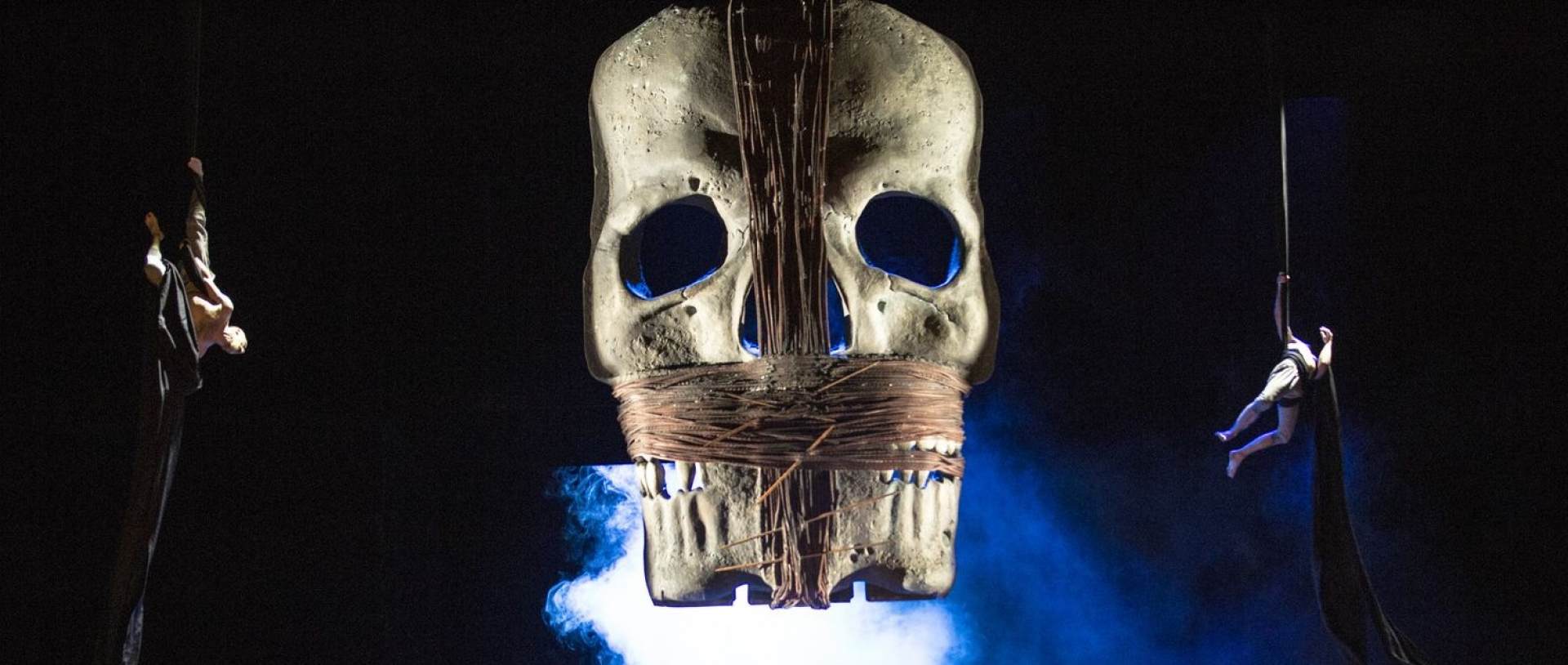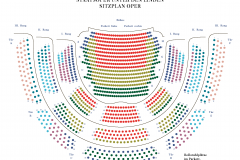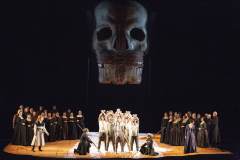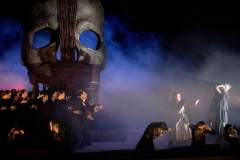Idomeneo
Mo | Tu | We | Th | Fr | Sa | Su |
DRAMMA PER MUSICA IN THREE ACTS (1781)
MUSIC BY Wolfgang Amadeus Mozart
TEXT BY Giambattista Varesco after Antoine Danchet
A storm rages off the coast of Crete, forcing King Idomeneo, who is returning from the Trojan War, to make an ill-fated promise to Neptune: if the enraged god lets him reach land safely, he will sacrifice the first man he meets. When Idomeneo arrives on the beach, he meets his son Idamante. But the unforgiving world of the gods seems determined to exact the king’s promise.
The storm evoked so vividly by Mozart’s music rages not only in nature but also in all his characters. Be it father and son, be it the two foreign princesses Ilia and Elettra, who hope for better days after the traumatic war – they are all at the mercy of natural forces and emotion, which the score by the then 25-year-old Mozart strikingly illustrates. »Idomeneo«, which completely revived the genre of the opera seria, opens the Staatsoper series of Mozart’s mature operas. Written in 1781 as a commissioned work for the outstanding ensemble of the Munich Residenztheater, he drew on his full musical range for this extensive and ambitious work. Mozart did not fulfil his hope of finding a new position and leaving Salzburg with this piece as his calling card. But his sheer ambition resulted in an exceptional score with challenging arias, individual vignettes, a virtuoso orchestral part and some great choral scenes, which are among the most impressive in Mozart’s oeuvre.
SYNOPSIS PRIORSTORY
Returning back home to Crete from Troy, destroyed after ten years of war, King Idomeneo’s ship gets caught in a heavy storm at sea. In a dire situation, the king begs the god of the sea Neptune for assistance and promises in return to sacrifice the first person he encounters upon arrival in Crete. The god allows the ship to survive the storm undamaged.
ACT ONE
Ilia, the daughter of the fallen Trojan king Priam, has preceded Idomeneo, arriving in Crete as a prisoner of war. Not only the loss of family and home has driven her to despair, she has also fallen in love with Idomeneo’s son, the Cretan prince Idamante who saved her from the water. Not only does she think this a betrayal of her fatherland, she considers the love hopeless, for she believes Idamante has long since fallen in love with the Mycenean Princess Elettra, who is also spending time on the island.
To celebrate Idomeneo’s immanent return, Idamante frees the Trojan prisoners of war and wants to reconcile the two enemy peoples with one another. In addition, he admits to the surprised Ilia that he is fond of her. Arbace, Idomeneo’s close advisor, interrupts the celebration with news of the frightful storm that probably sank Idomeneo’s ship. Idamante immediately sets off for the shore. Elettra, who has seen through Idamante’s efforts around Ilia, is in rage, for without Idomeneo’s advocacy she sees no chance of coming together with Idamante.
Idomeneo reaches the shore, but he cannot be happy about this due to his gruesome promise that he now had to fulfill. The first person he meets is his own son, whom he at first does not recognize, but then turns away from him, horrified. Idamante, just overflowing with happiness, is left speechless. The residents of Crete celebrate the return of their king.
ACT TWO
Idomeneo seeks advice from Arbace, who suggests not keeping the promise and getting Idamante out of the country instead: he should accompany Elettra back to Argos. Ilia thanks Idomeneo for her friendly welcome. From her warm words about the prince, Idomeneo deduces the love between the two and realizes that his oath not only threatens his own fate and that of his son, but that of Ilia as well.
Elettra rejoices over the travel plans and is sure that she will finally win over Idamante with Ilia’s absence. When after a brief farewell she wants to board the ship with Idamante, a new storm arrives and a sea monster causes the Cretans to flee. Hopelessly, Idomeneo offers himself as the sacrifice to reconcile his oath.
ACT THREE
Ilia is unsure whether to admit that she returns Idamante’s feelings. When he reveals to her that he wants to lose his life in a struggle with the monster, she can no longer be silent. The lovers are then surprised by Idomeneo and Elettra. Idomeneo sends his son, who still does not know the reason for his father’s harshness, on an unsure mission.
After the destruction caused by the monster, the high priest of Neptune and the people beg Idomeneo to finally carry out his sacrifice. Idomeneo, to the horror of all, announces the name of the victim and begins preparations for the ceremony.
Idamante returns unexpectedly victorious over the sea monster and has learned the content of the oath. He shows filial understanding, and declares himself prepared to make the sacrifice, which Ilia prevents at the last moment. She, the daughter of the enemies, claimes to be the real sacrifice. When she kneels before the high priest, a divine oracle pronouncement is sounded. The love of Ilia and Idamante has been victorious, and Idomeneo will be forgiven if he abdicates in their favor. While most can hardly believe the final word, Elettra lets her feelings of revenge run wild. Idomeneo carries out the divine command immediately and abdicates in favor of Idamante. All celebrate the new king and queen.
Program and cast
Duration: approx. 3:45 hrs including two intervals
Language: In Italian language with German and English surtitles
Recommended age: 12 years and older
CAST
MUSICAL DIRECTOR: Alessandro De Marchi
DIRECTOR: David McVicar
SET DESIGN: Vicki Mortimer
COSTUMES: Gabrielle Dalton
LIGHT: Paule Constable
CHOREOGRAPHY: Colm Seery
IDOMENEO: Rolando Villazón
IDAMANTE: Emily D'Angelo
ILIA: Serena Sáenz
ELETTRA: Hanna-Elisabeth Müller
ARBACE: Gonzalo Quinchahual
HIGH PRIEST OF NEPTUN: Florian Hoffmann
THE VOICE: Friedrich Hamel
KRETERINNEN, TROJANER: Serafina Starke, Sandra Laagus , Dionysios Avgerinos
STAATSOPERNCHOR
STAATSKAPELLE BERLIN
State Opera Unter den Linden
Staatsoper Unter den Linden is one of Berlin's most prestigious opera houses, with a rich history and significant cultural impact.
History:
The Staatsoper Unter den Linden was originally built between 1741 and 1743, under the direction of architect Georg Wenzeslaus von Knobelsdorff. It was commissioned by Frederick II of Prussia and was initially named the Königliche Oper (Royal Opera). The opera house has undergone several renovations and reconstructions, notably after World War II damage. It reopened in 1984, following a major renovation.
Construction:
The original design was characterized by its Baroque style, featuring an elegant façade and a grand entrance. The building was reconstructed in the 1950s and 1980s, maintaining its classical exterior while modernizing the interior. The façade features a classic portico with six Corinthian columns and a prominent central pediment.
Interior:
The interior is known for its opulent and classical design. The auditorium is renowned for its acoustics and grandeur, with luxurious velvet seats and elaborate decorations. The stage and seating areas have been updated to meet modern performance standards while preserving historical aesthetics.
Concerts and Performances:
The Staatsoper Unter den Linden hosts a variety of performances, including operas, orchestral concerts, and ballet. It is home to the Staatskapelle Berlin, one of Germany's leading orchestras. The opera house is celebrated for its high-quality productions and its role in Berlin’s vibrant cultural scene.
JOURNEY
The Staatsoper Unter den Linden has completely barrier-free access due to its excellent public transport connections.
ADDRESS: Unter den Linden 7; 10117 Berlin
SUBURBAN RAILWAY
S+U Friedrichstraße (S1, S2, S5, S7, S25, S75)
SUBWAY
Hausvogteiplatz (U2)
Museumsinsel (U5)
Stadtmitte (U2, U6)
Unter den Linden (U5, U6)
BUS
Staatsoper (100, 245, 300)
Unter den Linden/Friedrichstraße (100, 147, 245, 300, N6)
PARKING
Q-PARK parking garage Unter den Linden/Staatsoper
Bebelplatz, 10117 Berlin
There are five electric charging stations in the parking garage. Further information can be found here.
The underground car park on Bebelplatz offers disabled parking spaces and direct access to the opera house. On entering the car park between 5.30pm and 11.30pm, the maximum parking fee is €7. To use this tariff, enter your parking ticket in one of the pay machines and the message »Theatertarif« will appear on the display. Please note that it is not possible to use the tariff if you enter the car park before 5.30pm. so it will not be shown on the display. TIP: If you pay the theatre tariff at the pay machine before the event, you can avoid unnecessary waiting after the show.

 EN
EN DE
DE IT
IT FR
FR ES
ES RU
RU JP
JP RO
RO
 Seating plan
Seating plan 


